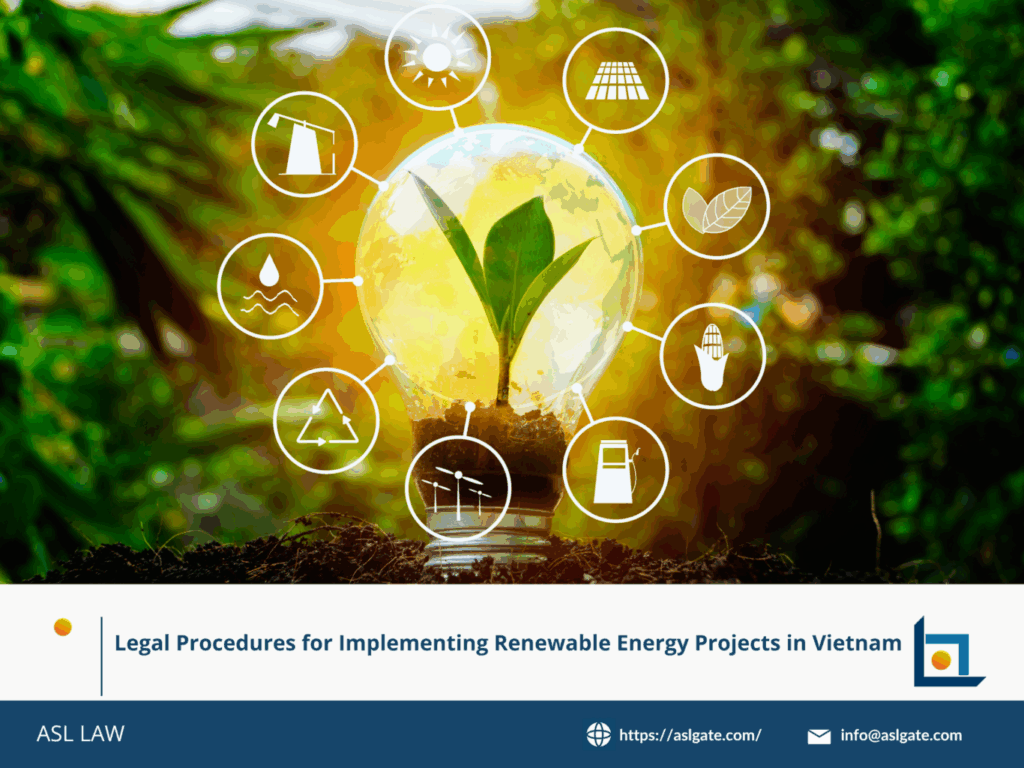Vietnam is steadily emerging as a strategic destination for renewable energy investment in the Asia–Pacific region, particularly in the wind and solar power sectors. However, implementing a renewable energy project is not merely a technical or financial matter—it is a complex process governed by a multi-layered legal framework, including oversea investment, land, construction, electricity, and environmental laws.
Understanding and complying with the legal procedures is a prerequisite to ensure the long-term feasibility and legality of any project.
Investment Licensing and In-Principle Approval
For foreign investors or large-scale projects, the first step is to obtain in-principle oversea investment approval from the relevant authority in accordance with the 2020 Law on Investment. Whether the authority is the provincial People’s Committee or the Prime Minister depends on the project’s capacity and potential impact.
Following this approval, investors must register or apply for an Investment Registration Certificate (IRC). This process involves determining whether the business line is subject to conditions, the level of permitted foreign ownership, and compliance with the national energy development master plan.
Project Planning and Site Selection
Under the Law on Planning and the Law on Electricity, a renewable energy project can only be implemented if it is included in the national or provincial power development plan.
Site selection must consider not only technical conditions such as wind speeds and solar radiation but also land-use planning, avoiding conflicts with protected forests, defense and security zones, or nature reserves. For offshore wind projects, determining sea coordinates, maritime zones, and obtaining opinions from specialized agencies are mandatory.
Land Procedures and Grid Connection Agreements
To commence construction, investors must complete procedures for land allocation, land lease, or land use rights transfer in accordance with the Land Law and the advice on real estate and construction in Vietnam by Vietnam Real estate law firm. At the same time, grid connection procedures with EVN or relevant transmission entities must be initiated early to ensure power offtake capability.
Signing grid connection agreements and power purchase agreements (PPA) remains challenging due to the absence of a fixed pricing mechanism after the expiration of the Feed-in Tariff (FIT) policies. Therefore, negotiating the PPA—particularly its term, pricing formula, and risk allocation—is a critical step in project implementation.
Construction Permits and Environmental Assessment
Pursuant to the Law on Construction and the Law on Environmental Protection, prior to construction commencement, the project must have its basic design appraised and approved, and must complete an Environmental Impact Assessment (EIA) or submit an Environmental Protection Commitment, depending on its scale.
In practice, preparing environmental documents should be done in close coordination with consulting firms to ensure both legal compliance and eligibility for international project financing or environmental guarantees. Additionally, if the project includes infrastructure such as transmission lines or substations, separate construction procedures for these components must be carried out concurrently.
Legal Capacity and Localized Requirements
Investors should note that many provinces—especially those with wind power potential like Ninh Thuan, Binh Thuan, Soc Trang, and Bac Lieu—have issued their own guidelines for renewable energy project procedures.
Understanding local regulations and coordinating early with the Department of Industry and Trade (DOIT) and the Department of Natural Resources and Environment (DONRE) is essential to expedite licensing. Additionally, requirements on equity capital ratios, technical qualifications, grid connection certifications, as well as the financial and implementation capacity of the investor will be rigorously evaluated during the application review process.
Conclusion and Recommendations
Implementing a renewable energy project in Vietnam requires thorough legal preparation—not only during the investment phase but throughout the project’s entire lifecycle. Investors should establish a clear legal compliance strategy, map out the appropriate procedural steps based on the project’s characteristics and scale, and work closely with legal counsel, technical advisors, and government agencies from the outset.
In the context of Vietnam’s commitment to emissions reduction and green transition, understanding and complying with the country’s legal framework is the key to ensuring the sustainability and long-term operability of any renewable energy project.
ASL Law is a leading full-service and independent Vietnamese law firm made up of experienced and talented lawyers. ASL Law is ranked as the top tier Law Firm in Vietnam by Legal500, Asia Law, WTR, and Asia Business Law Journal. Based in both Hanoi and Ho Chi Minh City in Vietnam, the firm’s main purpose is to provide the most practical, efficient and lawful advice to its domestic and international clients. If we can be of assistance, please email to [email protected].
ASL LAW is the top-tier Vietnam law firm for project and energy consultancy. If you need any advice, please contact us for further information or collaboration.

 Tiếng Việt
Tiếng Việt 中文 (中国)
中文 (中国) 日本語
日本語

